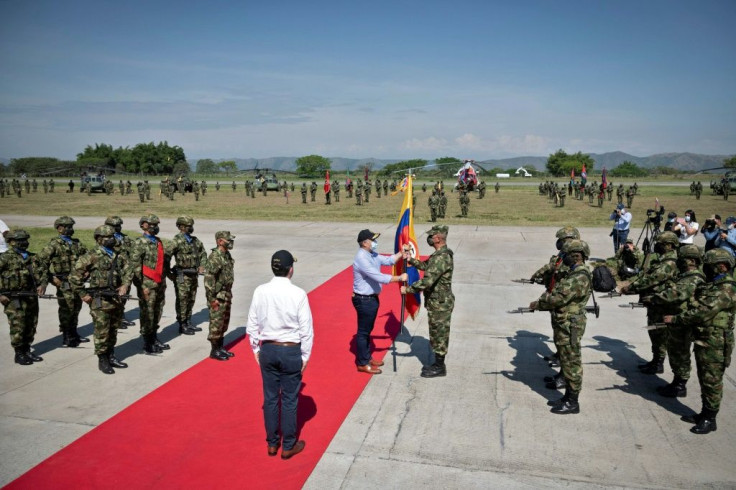Colombia Launches 'Elite Force' To Hunt Rebels, Drug Gangs
Colombia on Friday launched a 7,000-strong elite force to fight rebels financed by drug trafficking and other illegal activities, and which allegedly operate across borders.
Surrounded by helicopters, tanks and hundreds of soldiers at the Tolemaida military base in central Colombia, President Ivan Duque described the launch as "historic".
The force, he said, will be tasked with "subduing, beating and subjecting the structures of drug trafficking and the... threats linked to the illegal exploitation of minerals, trafficking of species, of persons and, of course, to any transnational form of terrorism."
The force will "without qualms" pursue members of the ELN -- the last active guerrilla group in Colombia, as well as drug gangs and ex-FARC rebels who have abandoned the terms of a 2016 peace deal, he said.
"Soldiers, it is a morally necessary, morally correct battle... Let's go for the defence of Colombia!" he proclaimed.
Duque did not refer to Venezuela.

When he first announced the creation of the elite force earlier this month, he said many of its targets "are protected in Venezuela" though he did not mention direct military action in the neighboring country.
His statement prompted Venezuelan leader Nicolas Maduro to vow to "respond forcefully".
In Caracas, he instructed the country's security forces to "clean the barrels of our rifles to answer them at any level we need to answer if Ivan Duque dares violate the sovereignty of Venezuela."
Bogota and a string of other countries recognise opposition leader Juan Guaido as interim president, prompting Venezuela to break off diplomatic ties with its neighbor in 2019.
In 2008, Colombia executed a FARC leader on Ecuadorian soil, sparking a serious diplomatic crisis with Quito, whose president at the time, Rafael Correa, was a socialist ally of Venezuela's.
Despite the 2016 peace accord, Colombia continues to battle a multi-faceted armed conflict involving leftist guerrillas, drug-traffickers and right-wing paramilitaries competing for control of the lucrative cocaine and illegal mineral extraction industries.
Colombia has repeatedly accused Venezuela of providing refuge to armed groups, which Caracas denies.
© Copyright AFP 2024. All rights reserved.











